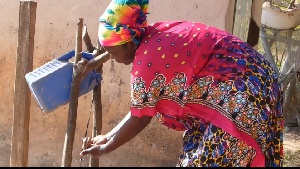A total of 9,263 out of 11,692 households representing 80 percent of households in the Kpandai District of the Northern Region have household toilets.
As Ghana joins the world to celebrate World Toilet Day, 3news.com takes a look at how the Kpandai District has moved from 11 communities with open defaecation-free (ODF) in 2016 to 190 in 2020.
The United Nations General Assembly officially declared World Toilet Day in 2013.
The Day is to inspire actions taken by member countries to tackle the global sanitation crises.
Worldwide, an estimated 4.2 billion people live without safely managed sanitation.
Out of this number, over 673 million people practice open defecation.
According to a World Bank report of 2017, 18.06 percent of the country’s population practice open defecation.
Successive governments over the years have instituted and implemented policies aimed at improving the sanitation situation in the country, especially on open defecation.
This ranged from the construction of community toilets such as the HIPC toilets with the recent one being those under the Ministry of Special Development Initiatives.
Even though the government has banned the construction of community toilets, its construction in schools, market places, lorry stations is still ongoing.
Household latrines have become the order of the day.
The Kpandai District is one of the districts in the Northern Region that has improved significantly over the years with more communities attaining ODF.
Between 2009 to 2016, only 11 communities were declared ODF.
However, from 2016 to 2020, the Kpandai District significantly reduced the Open defecation figures from 57 percent to 80 percent.
Out of a total of 425 communities, 190 have been declared ODF.
The success has been attributed to attitudinal change.
A visit to the Quatape Community in the Kpandai District shows the community five years ago did not have a single toilet.
The entire Community practised open defecation.
According to the chief of the community, Mudey Bawa, their wives supported them with money from the proceeds of the village savings and loans.
He is happy the community is now clean.
“I was always summoned to the district assembly over unsanitary conditions of my community. When the toilets issue came up, our wives supported us and we constructed.”
Some residents who spoke to 3news.com say children in the community do not fall sick as it used to be.
“We use to spend a lot on drugs because our children were always getting sick but for the past 6 years, things have changed and we are free.”
The Kpandai District Community Development and Social Welfare Director, Alhassan D. Alhassan, explains though the district has achieved significant strides, it is without any challenges.
He called for more funding to tackle sanitation-related issues.
“One big challenge when it comes to Sanitation is funding. Even though UNICEF has been supportive, that is not enough.”
Data from the Environmental Health Department of the Northern Region show the region has a total of 2,754 communities with 1,651 being ODF.
A 2018 District Sanitation League Table saw Tatale-Sanguli District placing first while Tamale metro came last.
As Ghana joins the whole world to celebrate the world toilet day, it is important to ensure conscious efforts are made to achieve a clean environment.
Bye-laws on sanitation should be enforced by local authorities through stakeholder engagement.
The theme for this year’s celebration is Sustainable Sanitation and Climate change.
Regional News of Thursday, 19 November 2020
Source: 3news.com
World Toilet Day: Kpandai District in perspective
Entertainment












